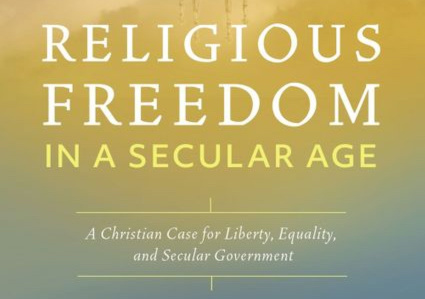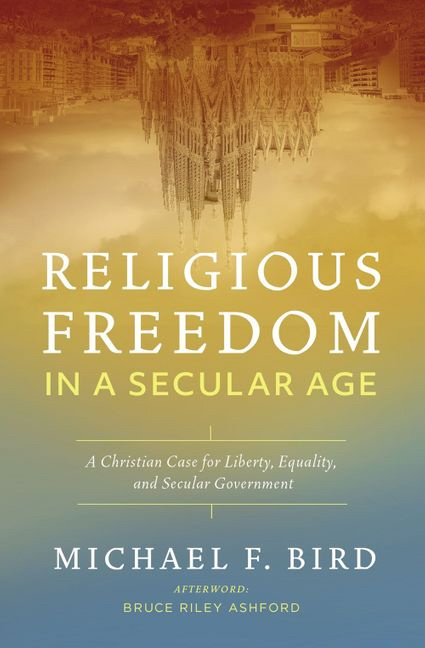
DAVID ADAMS reads Michael F Bird’s thought-provoking examination of what religious freedom looks like in an age of secularisation…
Michael F Bird
Religious Freedom In A Secular Age: A Christian Case for Liberty, Equality and Secular Government
Zondervan, Grand Rapids, Michigan, US, 2022
ISBN-13: 978-0310538882

“In this short book, Melbourne-based Anglican priest Michael F Bird, is sounding the alarm. But his is not a clarion call to offer what he calls a ‘token act of obedience to the latest progressive mantra’ or to make a pact with right-wing political leaders who ‘promise that our enemies will bow before us if we will but bow before them’. Rather, in this book Bird…offers what he called the ‘Thessalonian strategy’, a way to seek social transformation ‘through a subversive praxis that builds a countercultural society within a secular society’.”
It’s crunch time for religious freedom in the West – one only has to look at headlines in recent years related to everything from Australia’s national religious freedom review and the Masterpiece Cakeshop case in the US to the debates over religious freedom, church gatherings and COVID-19 lockdowns to see it’s been a hot topic in many nations.
In this short book, Melbourne-based Anglican priest Michael F Bird, is sounding the alarm. But his is not a clarion call to offer what he calls a “token act of obedience to the latest progressive mantra” or to make a pact with right-wing political leaders who “promise that our enemies will bow before us if we will but bow before them”
Rather, in this book Bird, who is academic dean and lecturer in New Testament at Ridley College as well as the author and editor of more than 30 books, offers what he calls the “Thessalonian strategy”, a way to seek social transformation “through a subversive praxis that builds a countercultural society within a secular society”.
“If we are to turn the world upside down, then we need to live upside-down lives, flipping the social and moral orders on their heads…” he writes. “Ultimately religious freedom will flourish in those places where religion is a primary cause of human flourishing.”
Bird starts by showing that secularism is not what most people think it is – not the absence of religion but an effort to keep religion “in its proper place and to ensure its freedom from interference by the state”.
“Secularism should not be regarded as the removal of religion from the public square; rather, it is the separation of powers between church and state and the freedom of conscience in matters of religion,” he writes.
What’s more, says Bird, this form of religious pluralism – he defines countries like the US and Australia as “pluralistic countries with a Christian heritage and secular government” – “is a distinctly Christan construction, based on a Christian view of human rights and liberty as it developed in Western jurisdictions”.
Bird then looks at the difference between secularism and secularisation. Defining the latter firstly as being a “description of the how societies either become secular or evolve in their secularism” or, secondly, as a “militant agenda whereby religion and people of faith are marginalized over their religion or coerced in matters of religion”, he goes on to examine not only how the Reformation in Europe was instrumental in ushering in an era of secularism but how, in more recent times, there has been a rise of more militant forms of secularism – a move which, as Bird points out, has been in part fuelled by terrorism, the scandals of sex abuse in the church, and religious opposition to LGBTQJ+ rights.
There follows a fascinating chapter on the clash between religious freedom and LGBTQJ+ rights in which Bird outlines the issues involved and then advocates a way forward which relies on compromise – a “settlement in which not everyone gets what they want but gets what they need to live at peace with each other” and another looking at the problems of Christian nationalism and progressive authoritarianism.
It’s in chapter six that Bird finally sets out his ‘Thessalonian strategy’ for being a Christian witness in a secular post-Christian world (the name relates to Paul’s evangelistic efforts in the city of Thessalonica, recounted in the Book of Acts). Rather than ensuring Christians dominate all areas of the public sphere to ensure protections for Christians (a popular notion on the political right in the US), positioning oneself as a “Christian in exile”, or adopting the ‘Benedict Option’ – an idea popularised by conservative journalist Rod Dreher which involves pursuing a form of community life and partial withdrawal from the world into Christian villages, Bird advocates a two-pronged approach.
“First,” he writes, “positively, we must champion confident pluralism as a societal philosophy, demonstrate community in action, love our neighbors, and live in such a way those who hate us cannot give a reason for their hatred. Second, negatively, we must challenge the new legal structures being erected around us, expose the hypocrites and prejudices of those who claim to be committed to tolerance, confront incursions into religious liberty and disrupt the secular narrative that religion is bad for social fabric”.
“All in all, we must turn the secularizing world upside down.”
We rely on our readers to fund Sight's work - become a financial supporter today!
For more information, head to our Subscriber's page.
That means many of the old divisions within Christianity “will have to matter less”; it means working alongside people of other faiths; it means using love as a “political weapon”; and, it means not being afraid to stand out from the crowd as we who follow Christ imitate Jesus. Bird also advocates, among other things, looking to ethnic minority church leaders for leadership and guidance on how to “be the church from the margins and while marginalized” and pursuing vocations of “cultural influence”. It also means being prepared to “stand up and explain the reasons for the hope that we have” as we enter what Bird agrees is, quoting Os Guinness, “a grand age of apologetics” (Bird provides a chapter towards the end when he address some of the key objections to Christianity and religion more broadly).
Well reasoned and erudite, Religious Freedom In A Secular Age is a must-read not just for those interested in the issue of religious freedom but for anyone of faith looking to navigate the road ahead in a changing world.





